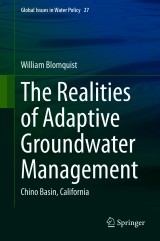Details

The Realities of Adaptive Groundwater Management
Chino Basin, CaliforniaGlobal Issues in Water Policy, Band 27
|
96,29 € |
|
| Verlag: | Springer |
| Format: | |
| Veröffentl.: | 01.03.2021 |
| ISBN/EAN: | 9783030637231 |
| Sprache: | englisch |
Dieses eBook enthält ein Wasserzeichen.
Beschreibungen
<p>This book has three primary objectives. The first objective is to provide scholars with a more realistic view of adaptive management, without arguing against adaptive management. Adaptive management is necessary as well as desirable, but it is not easy, and demonstrating that through the Chino Basin experience is an important goal. The second objective is to provide practitioners with encouraging yet cautionary lessons about the challenges and benefits of an adaptive approach – in similar fashion as the first objective, the goal here is to endorse the adaptive approach but in a clear-eyed manner that clarifies how hard it is and how much it requires. A third objective is to show all audiences that resource governance systems can fail, change, and succeed. There is no such thing as an ideal institutional design that is guaranteed to work; rather, making institutional arrangements work entails learning and adjustment when they begin to show problems as they inevitably will. </p><br><p></p>
Chapter 1. Introduction: The Realities of Adaptive Management.- Chapter 2. The Natural Physical System of Chino Basin.- Chapter 3. The Development of Water Supplies and Water Conservation in Chino Basin.- Chapter 4. Upstream-Downstream Conflicts, 1930-1960.- Chapter 5. Setting the Stage for a Chino Basin Management Program: Changes in Water Use, and the Third Santa Ana River Litigation, 1960-1969.- Chapter 6. The Chino Basin Adjudication.- Chapter 7. The Governance Structure for Chino Basin under the Judgment.- Chapter 8. Water Management in the Basin during the First 20 Years under the Judgment.- Chapter 9. Turbulence: The 1990s in Chino Basin.- Chapter 10. Reconstituting Chino Basin Governance and Management.- Chapter 11. Adapting to Social and Economic Change.- Chapter 12. Adapting to and with the Neighbors.- Chapter 13. Adapting to the Changing Realities of Water Supply.- Chapter 14. Adapting to Water Quality Problems and Priorities.- Chapter 15. Resetting the Safe Yield and Reappointing the Watermaster.- Chapter 16. Looking Ahead: The Reality of Continual Adaptation.- Chapter 17. Lessons from Chino Basin for Adaptive Groundwater Management [note: includes section on California’s Sustainable Groundwater Management Act (SGMA)].
<p>William Blomquist is Professor of Political Science and Adjunct Professor of Public and Environmental Affairs at Indiana University Purdue University Indianapolis (IUPUI), and a Senior Research Fellow of the Ostrom Workshop at Indiana University - Bloomington. His research interests concern governmental organization and public policy, with a specialization in the field of water institutions and water management. His published books include Dividing the Waters: Governing Groundwater in Southern California; <i>Common Waters, Diverging Streams: Linking Institutions and Water Management in Arizona, California, and Colorado</i> (with Edella Schlager and Tanya Heikkila); <i>Integrated Water Resource Management through Decentralization </i>(co-edited with Karin Kemper and Ariel Dinar); <i>Embracing Watershed Politics</i> (with Edella Schlager), and <i>Governing Complexity: Analyzing and Applying Polycentricity</i> (co-edited with Andreas Thiel and Dustin Garrick).</p>
<p>This book has three primary objectives. The first objective is to provide scholars with a more realistic view of adaptive management, without arguing against adaptive management. Adaptive management is necessary as well as desirable, but it is not easy, and demonstrating that through the Chino Basin experience is an important goal. The second objective is to provide practitioners with encouraging yet cautionary lessons about the challenges and benefits of an adaptive approach – in similar fashion as the first objective, the goal here is to endorse the adaptive approach but in a clear-eyed manner that clarifies how hard it is and how much it requires. A third objective is to show all audiences that resource governance systems can fail, change, and succeed. There is no such thing as an ideal institutional design that is guaranteed to work; rather, making institutional arrangements work entails learning and adjustment when they begin to show problems as they inevitably will. <br></p>
Presents groundwater issues, problems and solutions in the Chino Basin Discusses how the Chino Basin was removed from jeopardy and is exempt from the Sustainable Groundwater Management Act Highlights a major water resource in a semi-arid environment, with a history of agriculture-to-urban transition, a large current population

















